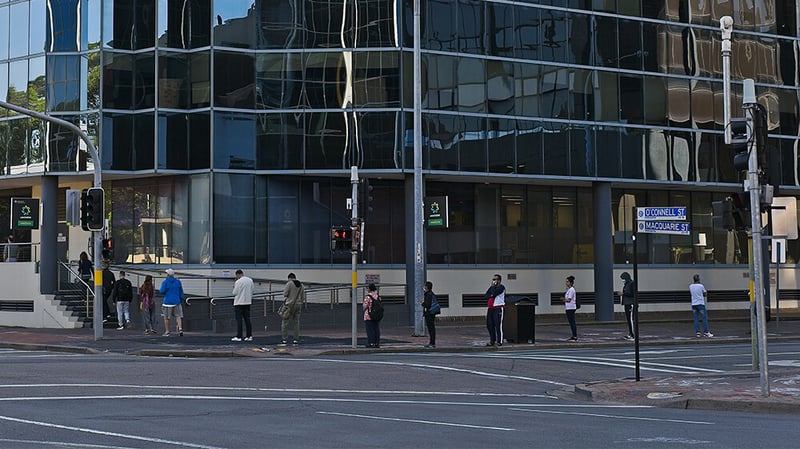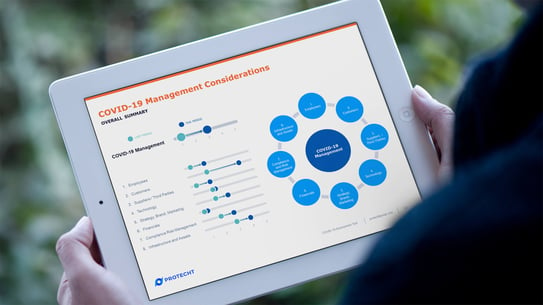The sharing of experiences at any time of life is an enriching and valuable experience. In times of crisis, experience sharing is gold. A key factor in human decision-making is asking "what is everyone else doing?"
We feel safer in a pack, and we gain comfort that others are having the same or similar experience as us.
We wanted to share experiences between a group of our clients, so we held a series of client roundtables in April where we collected together groups of our clients, totalling 36 organisations across a wide range of industries, including government .
So, what were the themes in the experiences that were shared?
General Observations
- Most clients had enacted their Business Continuity (BCP)/Crisis plans.
- All clients have "coped" but have experienced areas of significant stress.
- The type of impacts and their severity were varied across industries.
- Some clients are now focused on how they will emerge from COVID-19 and the longer-term changes it may create.
Governance
- Most organisations have regular Crisis Management meetings in place. Initially these were very frequent e.g. daily or even twice daily but now frequency has reduced.
- Most attendees mentioned the high level of stress on the crisis team as a result of working almost continually through the peak periods. As a result, some have now implemented forced leave for these staff.
- Some clients stressed the importance of having their key people in the crisis team, which is not just limited to the executive team. This ensured they are empowered and able to make quick decisions.
- One client, interestingly had a shadow crisis management team who step in while other members of the main team had breaks. The shadow team listened in on all Crisis Management meetings so they were completely up to speed and could step in seamlessly.
Business Continuity Plan (BCP)
 Some clients were surprised by how well their IT departments had coped during this crisis.
Some clients were surprised by how well their IT departments had coped during this crisis.
- Most clients had BCP/Crisis plans which they had enacted.
- All felt they were better prepared as a result of having the BC Plan.
- In a few cases, COVID-19 has shown where the BC Plan needs to be enhanced. For example, some had VPNs for connection but had to enhance capacity to cope with the communication volume and others needed to order more laptops (which was not easy once COVID-19 had hit).
- Some clients had conducted recent BCP tests and had chosen Pandemic for a dry run. As a result, they were well prepared for the actual events that have unfolded.
- Some clients were surprised by how well their organisations, and in particular, IT departments had coped. In particular, things that have taken weeks or months to achieve in the past have been pushed through and been achieved much quicker.
- All clients reported that their IT departments have been under significant stress.
Staff
- Other than front-line staff, most other staff have been working from home (WFH) since roughly the end of March. In a few cases, there were hiccups due to delays in obtaining laptops to allow for some staff.
- There was universally a lot of focus on staff well-being, especially on staying connected while being physically isolated. This initially led to back-to-back video calls all day but this has now settled back into normal operating rhythm.
Many reported using a range of innovative techniques to keep staff and teams engaged including online coffee/drinks, Wellness Wednesdays, Friday Funnies and so on.
- Many staff have found they are working longer hours, and some have, and are, struggling with the lack of separation of work and home life, especially when looking after children and other family members at home.
- Not a single parent said they enjoyed homeschooling their children, no-one intended to quit their job to become a full-time teacher!
- Many reported on setting up and using online forums that are not just work focused e.g funny pictures, recipes, etc.
- Nearly all clients reported a focus on encouraging staff to be healthy e.g. having team exercise challenges.
- Some clients have issued letters to staff who still need to travel for work to provide evidence if checked by authorities.
Impacts
 Many organisations are now having to consider customer hardship.
Many organisations are now having to consider customer hardship.
- A wide range of impacts were reported. Impacts and severity varied across industries. For example, while many industries experienced severe cash flow impacts, some Health Funds have experienced lower claims which has had a positive cash flow effect.
- Superannuation clients have had significant impact in needing to set up mechanisms to allow members early access to their Super.
- Material concerns were voiced over the potential for fraud relating to Super withdrawals and with insurance claims – "a fraud tsunami" was mentioned.
- Many are having to consider customer hardship.
- Some clients are also experiencing a significant increase in customer/member queries e.g. Super Funds on withdrawal process. This has put additional stress on staff and processes.
- Anecdotally, a roadside assistance client had their biggest day of battery replacements due to vehicles not being used for an extended period (and no battery chargers being used!).
- Many shared examples of projects being cancelled or deferred.
- Most have conducted a review of their risk registers for any risks affected by COVID. Many reported that the majority of risk ratings have not changed but it has been useful to go through the exercise.
- One client had taken the COVID-19 opportunity to raise awareness of Risk conducting a "Risk Blitz". This arose from a concern that the focus on COVID-19 would lead to people taking their eye off the ball on other risks.
- Some raised concern that new processes were being created on the fly and that controls may not be sufficient but there was little time to be more robust and no appetite to slow down.
- WFH has made it more difficult for risk and compliance teams to engage with the wider organisation to conduct their risk assessments and attestations. Compared to the work environment, you can’t just walk to people's desk to engage them.
- A number of clients reported that risk management was more front of mind than usual including specific CEO support.
- All noted the incredible speed of change in COVID-19.
Regulators/Government
- The financial services regulator was holding weekly meetings with the financial service clients. The focus was on Liquidity, Capital, Credit and Operational Resilience.
- Some noted challenges in keeping up with rapidly changing regulator and government positions and directives.
- There was some feeling of uncertainty as to the regulator reporting requirements would be going forward. One participant had pushed to get clarity to align internal board reporting with regulator requirements to avoid duplication.
- Some new short-term regulatory requirements are having their introduction deferred but medium-term deadlines are staying the same. Concern was raised that COVID-19 would cause a buildup of new regulatory requirements. Suggestions were made that we should try to "Flatten the Curve" of regulatory requirements as well as the COVID-19 curve!
Long-term Changes
Organisations are seeing a cultural change in experiencing and knowing they can cope with a higher-paced operating model and quicker decision making.
All participants thought that there would be a longer-term change as a result of COVID-19. These included:
- More acceptance of staff working from home.
- This in turn may open up some roles to disabled or other workers.
- May lead to reduced staff presenteeism.
- Potential reduced demand for office space in CBDs, which will probably reduce rents.
- Greater acceptance of online training.
- More acceptance of online rather than face to face meetings both with clients and internally.
- More focus on Supplier Risk Management and look through (e.g. per Modern Slavery).
- Changes in Supply Chain Management.
- More focus on BCP scenarios.
- May prompt a review of cost structures.
- Cultural change in experiencing and knowing the organisation can cope with a higher-paced operating model and quicker decision making. Examples were given of projects previously in the "Too Hard Basket" being completed within weeks!
Opportunities
Some participants had identified opportunities during COVID. These include:
- new online services
- new business models e.g. delivery services
- mergers and acquisition opportunities
- efficiency gains from longer term changes
- potential for financial institutions to regain customer trust after the Australian Financial Royal Commission
We hope you gain some value and insight in the above experience sharing and if you have any other anecdotes to share, please let us know.
FREE ASSESSMENT TOOL
Assessing Your COVID-19 Organisational Health


